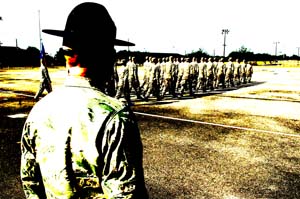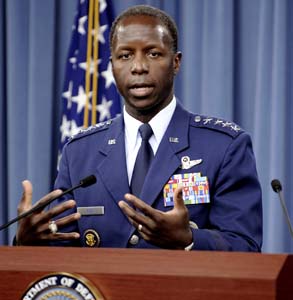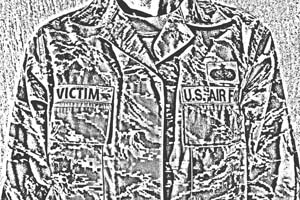The Air Force’s war on sexual assault in the ranks is not going well, despite an all-out drive to eliminate the problem and the many stern anti-harassment warnings of high-level Pentagon leaders in recent years.
Far from bringing a halt to these assaults, USAF has not even been able to arrest the worrisome upward trend. The rate of incidents continues to increase, concedes Gen. Mark A. Welsh III, the service’s new Chief of Staff.
At his confirmation hearings in July, Welsh told the Senate Armed Services Committee, “There is a lot more work to be done here. … We’ve done a lot of work, and we’ve made no difference.”

| ||
|
(USAF image) |
His assessment is borne out by the multitude of high-profile sexual misconduct cases that have rocked the service over the last year.
Seven former military training instructors at JB San Antonio-Lackland, Tex., were charged with sexual misconduct, for victimizing more than 30 trainees. Their offenses range from verbal misconduct to rape. As of September, 11 more instructors were under investigation for similar alleged offenses.
The number of MTIs under investigation began to climb in June 2011, when an Air Force trainee first reported an assault by SSgt. Luis Walker.
The Cases
At the time of the incident, Walker was an MTI assigned to 326th Training Squadron in San Antonio. A military jury convicted him of having committed 28 criminal acts, comprising rape, adultery, aggravated sexual assault, and violation of a lawful order regarding unprofessional relationships with at least 10 female recruits.
The Air Force handed Walker a sentence of 20 years in prison, a dishonorable discharge, a reduction in rank to airman basic, and a forfeiture of all pay and allowances. It was the most severe punishment meted out so far in the unfolding MTI scandal.
Walker’s case was preceded by that of SSgt. Peter Vega-Maldonado, a former MTI assigned to the 331st Training Squadron, San Antonio. In June, Vega-Maldonado pleaded guilty to a single charge of having an improper relationship with a trainee and of violation of a no-contact order. A military judge imposed a sentence of 90 days of confinement, 30 days of hard labor, forfeiture of $500 of his monthly pay for four months, and reduction in rank to airman.
Vega-Maldonado’s plea agreement required him to give testimony against fellow MTIs. For this, he received testimonial immunity, meaning that none of his statements given under oath could be used against him in additional cases.
However, Vega-Maldonado surprised military officials with a bombshell admission, given under oath, of having had improper relationships with not one but with 10 recruits. Vega-Maldonado took, in jailhouse parlance, an “immunity bath,” and USAF hasn’t been able to bring additional charges against him.
In a special court-martial held on Aug. 1, TSgt. Christopher Smith, another MTI who had been assigned to the 331st TS, was found guilty of seeking an intimate relationship with one recruit and carrying on a personal social relationship with another recruit. He was sentenced to 30 days of confinement and reduction in rank to airman first class.
SSgt. Kwinton Estacio pleaded guilty to having sex with a trainee and in September received a sentence of a year in prison, reduction in rank to airman, and a dishonorable discharge. The jury acquitted him of wrongful sexual contact, due to the issue of consent by the trainee.
On Sept. 27, a special court-martial sentenced SSgt. Jason Manko to 45 days of confinement, reduction to airman first class, forfeiture of $500 for three months, and hard labor for 30 days. He had pleaded guilty to seeking to develop an unprofessional relationship and had sex with a trainee.
Thus, as of late September, US military authorities had completed only five court-martial proceedings stemming from the Lackland scandal, and two more were scheduled.
Meanwhile, the scandal at Lackland also has led to nonjudicial punishments. So-called “loss of confidence” problems have brought the firings of two commanders at basic military training.
One of those fired was Col. Glenn E. Palmer, commander of 737th Training Group, who oversaw the training of all recruits going through BMT. The other was Lt. Col. Michael Paquette, commander of the 331st Training Squadron, where the majority of the accused MTIs were assigned and committed their offenses.
Gen. Edward A. Rice, the commander of Air Education and Training Command, has vowed to “aggressively” pursue all alleged perpetrators. Rice has launched both internal and external investigations aimed at discovering the true scope of the problem.
In late June, the Air Force assigned Maj. Gen. Margaret H. Woodward to lead an outside probe. Woodward, who commanded the US air campaign in Libya, was serving as the acting director of operational planning, policy, and strategy at the Pentagon at the time. She has since completed her report, which was still being reviewed as of early September, said AETC spokesman Nathan Simmons.
“We are leaving no stone unturned,” Rice declared at a late June press briefing at the Pentagon. “I’m not minimizing this investigation. In fact, I’m being as aggressive as I can, and we won’t stop the investigation until I’m completely satisfied that we’ve done as thorough a job as we possibly can.”
Since the allegations first came to AETC’s attention in 2011, the command has “further tightened those protective measures that were already in place,” said Rice.

| ||
|
Gen. Edward Rice Jr., AETC commander, vows to aggressively pursue all perpetrators. (USAF photo by SrA. Christina Brownlow) |
Within 72 hours of arrival at Lackland, trainees now receive a special briefing from the training group commander and an interdisciplinary team that includes the judge advocate, the sexual assault response coordinator, and the chaplain. This briefing covers the rights and responsibilities of a trainee who encounters acts of sexual misconduct.
The training group commander has been directed to read, within 24 hours of receipt, all urgent comment sheets submitted by a trainee and immediately report to higher authority any allegation of sexual misconduct. Accused MTIs are to be removed from their flights immediately and issued a no-contact order, said Rice.
Moreover, Rice added, his command is considering other steps. These include expanded training for trainees, instructors, and leaders to prevent sexual harassment; changes to the instructor selection process; and the hiring of more instructors.
The Air Force is considering taking the major step of assigning only female MTIs to lead female flights. Rice said he has not ruled out such a change, which would be a BMT first.
After the allegations surfaced, AETC took the unprecedented step of shutting down basic training for an entire day so that it could interview and survey all 5,900 recruits who were going through training at Lackland at the time.
Rice said that more than 98 percent of airmen who are surveyed after BMT have positive comments about their training experience.
Roughly 35,000 recruits go through BMT at Lackland each year. They are trained by some 500 military training instructors, each of whom goes through a rigorous screening process that includes psychological evaluations. Of those 35,000 trainees, 22 percent are women, said Rice, but only 11 percent of the instructor corps is female.
“The vast majority of our 500 military training instructors are performing magnificently in a tremendously demanding environment,” Rice said. “No one—no one—is more angry and disappointed than they are that a relatively small number of their cadre has cast a shadow over the entire program.”
Rice added that not only Air Force leaders but also the instructors themselves are “committed” to doing “everything possible” to rid the Air Force of the problem.
Even as the Air Force was struggling to get a grip on the BMT problem in San Antonio, another high profile sexual assault investigation was unfolding halfway around the world.
At Aviano AB, Italy, Lt. Col. James H. Wilkerson, the inspector general of the 31st Fighter Wing, was removed from his post by the wing commander, Brig. Gen. Scott J. Zobrist. Wilkerson now faces a court-martial on charges that he groped a female civilian base employee in March.
Efforts Not Working
Zobrist also fired the wing’s vice commander, Col. Dean Ostovich, citing a loss of confidence in Ostovich’s ability to lead. That decision was based, in part, on information that surfaced during the Air Force Office of Special Investigations review of allegations against Wilkerson. Ostovich has not been charged with any offense. The former vice commander, who was reassigned to the Pentagon, could be called as a witness in Wilkerson’s trial, which was slated for October.
In an Aug. 16 statement, Zobrist noted that Aviano was a small and close-knit community. “For us to operate effectively,” he went on, “our airmen, civilian employees, and family members must be confident in their own security and the safety of their loved ones. Sexual assault threatens the very fabric of our community. I take any allegation of criminal conduct by someone under my command very seriously—regardless of the rank of the accuser or that of the alleged offender.”
In his Senate confirmation hearing, Welsh said that the Air Force in recent years had implemented many steps aimed at curbing sexual assaults in the service. Training in sexual assault prevention has been institutionalized at every level, he said, and the Air Force has added new special prosecutors and OSI investigators specially trained in pursuing sexual assault cases.
Welsh acknowledged, however, that the problem persists.

| ||
|
(USAF photo illustration by SrA. Marc I. Lane) |
“What we have been doing is not working,” he said. “It’s not for lack of effort.”
Statistics bear out his gloomy view. Welsh told Senators that USAF projects a total of roughly 600 sexual assaults will be reported this year. That would essentially duplicate the scope of the problem in 2011, when 614 assaults were reported.
Sen. John Cornyn, the Texas Republican whose state is the scene of the MTI problem, placed a hold on Welsh’s nomination until he was confident the service was “adequately addressing the unacceptable situation at Lackland and taking corrective steps to reform their training program to prevent this from happening again.”
Cornyn and Welsh held a private meeting on Aug. 2. When it was over, Welsh had agreed to begin a formal review of Air Force policy and sexual assault prevention training, as well as the status of fraternization and inappropriate relationships between airmen. He also agreed to take a look at the organizational structure at BMT and report back to Congress regularly on his findings.
Cornyn removed his hold on the nomination, saying he saw in Welsh “genuine resolve” to tackle the problem.
As Welsh said, “The goal for sexual assault in the United States Air Force … is not a declining trend. It’s zero. … In this crime, the goal is zero.”
|
Assaults Cannot and Will Not be Tolerated The Air Force is close to wrapping up an “exhaustive investigation” of sexual assaults throughout the service’s Air Education and Training Command, AETC Commander Gen. Edward A. Rice Jr. said during the Air Force Association’s Air & Space Conference in September. USAF launched the investigation after a series of allegations against basic military training instructors surfaced earlier this year. “I have just concluded several productive meetings here in Washington, D.C., with select members of Congress and other government officials to brief them on the commander-directed investigation of basic training led by Maj. Gen. Margaret Woodward,” said Rice in a late September statement. He added, “The leaders I’ve met with in Washington have shared helpful input, which will help guide the Air Force as we develop the best means to address the problems identified.” Woodward’s team interviewed more than 200 people at BMT, including leadership, faculty, and trainees. The team also analyzed more than 25,000 end-of-course surveys from BMT graduates completed since 2009 and conducted its own survey of more than 18,000 trainees, students, MTIs, training leaders, and technical training instructors, according to a statement released by AETC. The investigation took about 20,000 man-hours to complete and resulted in 46 recommendations—30 of which had either been fully or partially implemented as of mid-September, said Rice. During his keynote address to the conference, Air Force Secretary Michael B. Donley said the entire force was “shocked and troubled” by the scandal. “The misconduct alleged has no place in our Air Force culture and is especially egregious when it occurs in the basic military training environment,” said Donley. “This behavior constitutes an abuse of power and an abuse of trust which cannot and will not be tolerated.” Donley said he hopes the investigation “identifies any systemic failures” and promised that Air Force leaders would “be addressing next steps in the immediate weeks and months ahead.” Chief of Staff Gen. Mark A. Welsh III said he takes the problem of sexual assaults in the military personally. “I get emotional about this,” he said. “This one bothers me in the biggest way, and it has for a long time.” “This is a horrible crime, and it’s not just the [victims], it’s the family, friends, the organization. … It just sucks the life” out of everyone affected, Welsh said. “The idea that we can’t protect people in our Air Force from predators kills me.” Air Force officials have chosen a woman—Col. Deborah J. Liddick—to replace ousted Col. Glenn E. Palmer as the new commander of the 737th Training Group, USAF’s basic military training unit at JBSA-Lackland, Tex. Palmer was fired in August after Air Force leaders “lost confidence” in his ability to lead. In September, Defense Secretary Leon E. Panetta ordered a complete revision of the Defense Department’s sexual assault prevention and response training requirements, including working with Congress to create a “special victims unit” that can assist each of the services when necessary. The new guidance also looks to establish a new policy that would allow victims of sexual assault to “quickly transfer from their unit or installation as a way to protect them from possible harassment and to remove them from proximity to the alleged perpetrator,” states a Sept. 25 Pentagon release. “Leaders at every level have an obligation to adhere to and enforce Air Force standards and to establish and maintain a unit climate and culture that reflects what we stand for,” said Donley. “This is family business. Nobody will do this for us. We must do it for ourselves, for our airmen, and for our Air Force. And I have every confidence that we will confront this challenge and come out a stronger and better Air Force on the other side.” |